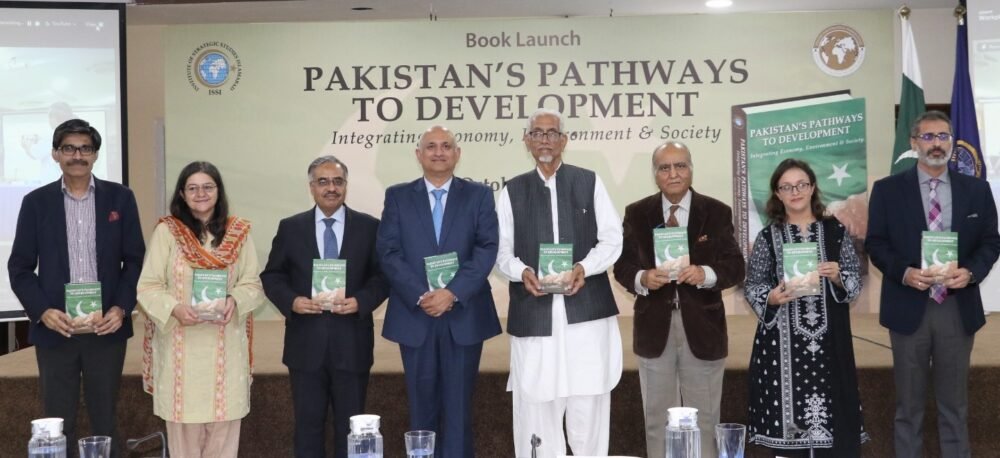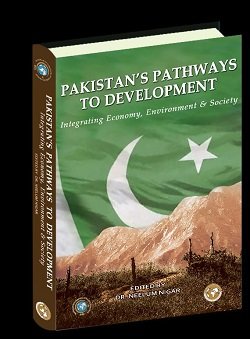Herald Special Reporter
Islamabad: The Centre for Strategic Perspectives (CSP) at the Institute of Strategic Studies Islamabad (ISSI) Wednesday launched its first edited volume, Pakistan’s Pathways to Development: Integrating Economy, Environment, and Society bringing together insights from leading economists, environmental and social experts, as well as policymakers, including three emerging women scholars from Gilgit-Baltistan.
It offers an in-depth exploration of how Pakistan can achieve sustainable development by balancing economic growth, environmental preservation, and social inclusion.
Other notable speakers included Haroon Sharif, former Chairman of the Board of Investment (BoI); Kosar Bano, gender specialist; Dr Faisal Bari, Associate Professor at LUMS; and Dr Safdar Sohail, Executive Director of SPRC. They provided critical perspectives on the strategies Pakistan must adopt to compete effectively in the global economy.

In his keynote address as the guest of honour, former Advisor to the Prime Minister on Finance, Dr Waqar Masood Khan underscored the importance of macroeconomic stability and inclusive policies that address gender inequality, income disparities, and access to basic services like health and education.
He noted that while Pakistan has faced external challenges such as regional conflicts and sanctions, the country must also address domestic issues, including population growth and political instability, to ensure sustainable development.
A holistic approach
In his address, ISSI director-general Ambassador Sohail Mahmood emphasized that the book’s focus on the economy, environment, and society aligns with the key pillars of sustainable development.
He explained that an integrated approach is crucial to shaping Pakistan’s future. The book presents strategies for enhancing economic competitiveness, increasing exports, and attracting foreign investment while aligning economic policies with shifting global geopolitical realities.
According to Ambassador Mahmood, this would enable Pakistan to thrive in an interconnected and competitive global economy. He also highlighted the importance of leveraging digital technologies to strengthen Pakistan’s economy. These innovations, he noted, could support fiscal reform, improve debt management, and enhance resilience in an unpredictable global landscape.
The book advocates for a transition to green energy, emphasizing sustainable energy practices and the importance of international cooperation in achieving long-term environmental goals.
The societal aspect of development is also a key focus of the book.
Mr Mahmood stressed the need for educational reforms, poverty alleviation, and youth empowerment to advance sustainable development goals.
He discussed the importance of gender inclusion and addressing demographic trends, particularly the role of marginalized groups, in achieving equitable development.
Economic restructuring
Haroon Sharif, in his remarks, discussed the economic challenges facing Pakistan, highlighting the need to transition from a geopolitical model to one centred on economic competitiveness. He pointed out that issues such as climate change, pandemics, and global supply chains are now integral to economic resilience.
Mr Sharif, who has contributed a chapter to the book on ‘enhancing Pakistan’s global competitiveness’, stressed that the country must focus on job creation, productivity, and regional trade policies to restore its competitive edge in the global market.
Challenges in education and health
Noted educationist Dr Faisal Bari spotlighted Pakistan’s shortcomings in education and health. He argued that despite some economic growth, Pakistan has failed to invest sufficiently in these critical areas. According to Dr Bari, who has written a chapter titled: “Educational Conundrums of Pakistan: Where We Are and the Way Forward” reversing this trend requires immediate action to improve education quality, expand access, and address poverty and malnutrition.
Gender and climate resilience
Kosar Bano, a gender expert at The Asian Disaster Reduction & Response Network (ADRRN), touched upon the gendered impacts of climate change, highlighting how women and girls are disproportionately affected by climate crises.
She stressed the need for gender-sensitive policies and empowering women in disaster response and recovery efforts.
Ms Bano, who has co-authored with Rozina Begum the chapter “Bridging Divides: Gender Equality and Social Inclusion in Pakistan’s Climate Crisis” to the book emphasized gender-inclusive decision-making that enhances community resilience and strengthens adaptation strategies in the face of climate change.
Societal stress and economic strain
Dr Safdar Sohail who has written a chapter on “Social Anomies in Pakistan: Manifestations, Causes, and Consequences”, discussed the concept of “anomie,” or normlessness, to describe the current state of social disintegration in Pakistan.
He argued that economic instability has eroded trust in institutions and social cohesion, posing a significant challenge to long-term development.
Earlier in her opening remarks, Dr Neelum Nigar, editor of the book, emphasized that the book arrives at a critical time for Pakistan as it faces persistent economic challenges and escalating external debt.
She praised the diverse range of contributors for advocating integrated solutions that account for the interdependence of economic, environmental, and social factors.
In his closing statement, ISSI Board of Governors chairperson Ambassador Khalid Mahmood highlighted Pakistan’s shift from a security-cantered approach to a focus on geo-economics and comprehensive security.
He stressed that sustainable development and inclusive social progress are now central to Pakistan’s national agenda.
Content overview
The book is organised into 10 chapters authored by leading experts. The foreword is written by Ambassador Sohail Mahmood and the introduction by Dr Neelum Nigar who has also edited it.
The other chapters of the book include: “Pakistan’s Pivot to Geoeconomics: Operational Perspectives” by Dr Ishrat Hussain; “Fiscal and Debt Management Challenges” by Dr Aisha Ghaus Pasha; “Growing Tech Ecosystem and Digitalization Environment” by Dr Sahibzada Ali Mahmud; “Climate-Resilient Sustainable Agriculture: Strategies and the Way Forward” by Prof Dr Iqrar Ahmad Khan; “Traditional and Green Energy: Finding Solutions and Opportunities for Pakistan through International Cooperation” by Arthur Makhlaiuk; jointly written by Kosar Bano and Rozina Begum from Gilgit-Baltistan; “Harnessing Youth Bulge: Challenges and Policy Recommendations” by Nazia Malik and Dr Saleem H. Ali.

The High Asia Herald is a member of High Asia Media Group — a window to High Asia and Central Asia

